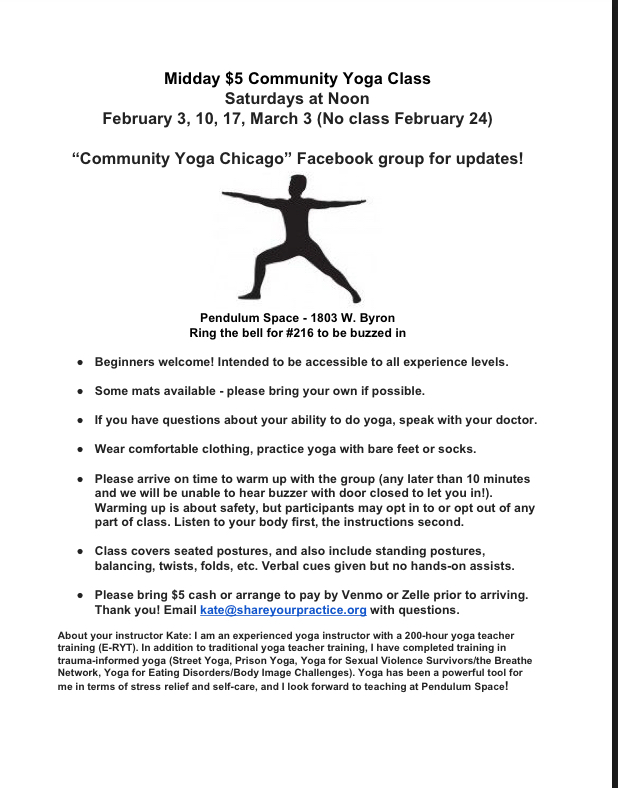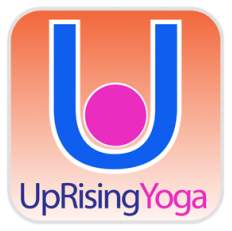- Go into the training aware that you may be encountering heavy topics.
- As much as possible, ensure you have support available outside the training, or even within it – think of a friend or relative or therapist who may be available to check in with, or someone in the training you know.
- Take breaks when you need to. Make it a bathroom break or a water break or a walk break. Every training is different, I thought it was tremendously valuable that Molly encouraged us to do this, to sit comfortably or do legs up the wall or to slouch if we needed to … maintaining “solid alignment” seated cross legged may be good for our spines but really doesn’t take into account our mental health at all. You shouldn’t need to give a reason to take a break.
- Nourish yourself adequately with water, food, and self-care practices outside of the training.
Category: Uncategorized
NEW $5 Community Yoga Class – Midday Saturdays at Pendulum Space

Join me for low-cost community yoga near the brown line, middays on Saturdays! Just $5 per person cash. Initially class is from noon-1pm and this time will shift slightly based on availability of the space. Follow Chicago Community Yoga Facebook group to stay posted on news and updates! I hope to see you there.
When and where is the class?
Pendulum Space at 1803 W Byron. Ring the bell for #216, enter the door, and take the first staircase up on the left. Follow the signs to Room 216. Yoga will be in the back/last studio all the way down the hall. I will do my best to make temporary signs with arrows.
Generally we need to wait to enter the space until the start time of the class. If you arrive more than 5-10 minutes early and there is no response when you ring the bell, please be patient – you might have arrived before me! Definitely arrive within the first 10 minutes of the start time as we can’t hear the buzzer to let you in after that!
Continue reading “NEW $5 Community Yoga Class – Midday Saturdays at Pendulum Space”
Half Poses
 This week I’m teaching a sequence with lots of “half poses”. Some are well-established halves (half split, half pigeon) but others are a little more creative (half tadasana, half eagle – what!? Take class and find out!). Why? Partly, for variety! I love love love sequencing and for me, when I practice, NOT knowing what to expect and really truly NEEDING to be focus and listen to know where to go is what brings me into the present moment rather than letting my mind wandering.
This week I’m teaching a sequence with lots of “half poses”. Some are well-established halves (half split, half pigeon) but others are a little more creative (half tadasana, half eagle – what!? Take class and find out!). Why? Partly, for variety! I love love love sequencing and for me, when I practice, NOT knowing what to expect and really truly NEEDING to be focus and listen to know where to go is what brings me into the present moment rather than letting my mind wandering.
8 Ways That Sexual Violence Crisis Training is Relevant to Teaching Yoga
In contrast to rape crisis hotline volunteers or medical advocate, it’s less likely that I’ll be having conversations so specifically about sexual violence as a yoga teacher – but the level of detail that came up really expanded my picture of how sexual violence can affect people. A survivor assaulted by someone they know and will likely see again.One person’s concern that if they report the assault, their partner won’t understand, or the situation in which it happened will make their sexual orientation known and they haven’t come out. Parents who want their (adult) child to pursue a different path after the assault – reporting it or not, changing jobs, getting counseling – and struggle to let their child choose her/his own path.
2. Victim-blaming is still a thing, whether it’s blatant or subtle (and “subtle” can be just as insidious – see microaggressions below). Rape culture is the attitude that normalizes or trivializes sexual assault, for instance, shifting the burden of prevention from the perpetrator and the wider social context that normalizes sexual violence to the (potential) individual survivors: take self defense! don’t wear revealing clothing! never walk alone at night! Self defense isn’t a bad thing, but the main problem is not that survivors didn’t take self defense, but that perpetrators committed violence against them.
Continue reading “8 Ways That Sexual Violence Crisis Training is Relevant to Teaching Yoga”
Cultural Competency in Yoga: What is it and why does it matter?
 Cultural competency is a hugely important topic – and also a hugely scary one to write about, for me.
Cultural competency is a hugely important topic – and also a hugely scary one to write about, for me.Holding space for a discussion around this topic is, in my view, more important than me personally figuring out and sharing the “right” way to look at this topic. With cultural competence in mind, in particular, it makes sense to hold space for voices from people of color, not just “too” but primarily, instead of solely my view as a white yoga instructor.
Continue reading “Cultural Competency in Yoga: What is it and why does it matter?”
YSC 2017 – The Art of Facilitation w/Dr. Melody Moore – What I Took Away
 I got to Omega Institute just before 10am after a full night of driving (and napping in the car!). The irony of attending a workshop that at least touched on self-care after depriving myself of a hotel room or a flight to save money was not lost on me. But we all have to make sacrifices to do awesome things!
I got to Omega Institute just before 10am after a full night of driving (and napping in the car!). The irony of attending a workshop that at least touched on self-care after depriving myself of a hotel room or a flight to save money was not lost on me. But we all have to make sacrifices to do awesome things!Continue reading “YSC 2017 – The Art of Facilitation w/Dr. Melody Moore – What I Took Away”
YSC 2017: Community Agreements & What I Took Away
 I spent last weekend in Rhinebeck, New York at the Yoga Service Conference. I’d been looking forward to all of the sessions (and blogged about my thoughts on a few in advance!). In true yoga form, our printed program started with some community agreements intended to foster connection, understanding and respect (see photo!). Dr. Melody Moore hosted the Friday intensive I attended, and she guided our smaller group through the creation of some of our own community agreements. Among others – confidentiality.
I spent last weekend in Rhinebeck, New York at the Yoga Service Conference. I’d been looking forward to all of the sessions (and blogged about my thoughts on a few in advance!). In true yoga form, our printed program started with some community agreements intended to foster connection, understanding and respect (see photo!). Dr. Melody Moore hosted the Friday intensive I attended, and she guided our smaller group through the creation of some of our own community agreements. Among others – confidentiality.
YSC 2017 – On Being: The Art of Facilitation with Dr. Melody Moore
My weekend at the 2017 Yoga Service Conference will start with Dr. Melody Moore‘s Friday intensive session on facilitation. I’m especially interested in this session because even though my own work with higher trauma groups is pretty limited, it can still be a challenge to find a balance between serving others and caring for yourself.
“As facilitators, it is necessary that we understand how to become safe havens for our clients and students without causing harm to ourselves. Often, in our attempts to serve others, we end up overwhelmed, over-invested, or overcompensating…We will explore attachment theory, boundaries, shadow work, family systems, and group dynamics” (text from YSC website)
Even for those of us, or for me at least, who may not experience vicarious trauma in the sense of getting into great detail about specific challenges facing the people we teach as social workers or therapists might, it can be a lot to recognize that those circumstances are real for the people we teach and care about … and recognize that, despite what we CAN offer through yoga, there are many things we cannot offer..and perhaps things that no one can offer.
I’ve found it hard some days to transition from teaching in a jail, or taking a training on sexual violence, into something in my life with a more joyful or lighthearted intention. But I can still recognize how important it is to maintain a balance, to practice self care, so I can also extend care and positive energy to others.
I plan to blog about the sessions I attend, so stay tuned for my impressions of this intensive!
Why does yoga and body image matter?
When I talk about trauma-informed yoga or yoga service, some people want to know, or at least wonder: what’s your story? What have you dealt with that makes you want to do this?
And I get it. Many people interested in this work come to it because yoga has helped them heal. Yoga has helped me heal too! When I’ve met someone who shares that they have dealt with something similar to me, I feel more connected to them. Often, even if I haven’t experienced something similar, it’s inspiring to hear how yoga has helped them – and even with different life experiences, our yoga experience may be similar.
Continue reading “Why does yoga and body image matter?”
Training: UpRising Yoga
 Name of Organization: UpRising Yoga
Name of Organization: UpRising Yoga
Name of Training: Trauma Informed Yoga Training
Location: Los Angeles, CA
Number of Hours: 17 hours
Contact Email: help2uprise@gmail.com
Cost: $300 early bird; $350 regular price
Other Info: This 2-day training will provide you with effective, yoga based tools for working with incarcerated youth and other at-risk populations. As part of the training, you will learn about UpRising Yoga’s approach to teaching yoga, based on practical experiences learned from our work in incarcerated settings. You will also have the unique opportunity to interact and learn from subject matter experts in juvenile justice, public policy, healthcare, community engagement and research. You do not have to be a yoga instructor to attend our training. In fact, many social workers, psychologists, teachers, and more, have been able to incorporate our teachings into their practices.